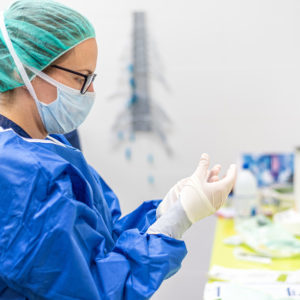In March, when coronavirus was spreading in the U.S. and personal protection equipment was in short supply, Hernan Albamonte’s wife was desperate to find N95 masks for her family.
“She spent hours on Amazon and on eBay and other marketplaces trying to find them,” said Albamonte, before she eventually ordered a box from China-based marketplace AliExpress.
What arrived were poorly made knockoffs. Like thousands of individuals, healthcare systems and governments, she had been the victim of PPE fraud. What makes Mrs. Albamonte’s story different is that her husband is the head of Illicit Trade Prevention at Philip Morris International.
“So trust me when I say that PPE fraud is a huge problem and it can happen to anyone,” Albamonte said during a online conference on PPE fraud and its impact on the supply chain — including right here in the Delaware Valley. The conference featured members of the private sector and law enforcement working together to both raise awareness for consumers and help governments keep fraudulent and defective materials out of the supply chain.
Just last week came word that a sting led by the Philadelphia office of the Department of Homeland Security disrupted an ISIS plot to use online PPE fraud to fund terrorism.
The impact of this push by criminal organizations into the PPE supply chain is being felt in Pennsylvania. Some Delaware Valley schools have struggled to lock down a reliable supply of protective wear needed for reopening. New demands on nursing homes means more competition for PPE. Area hospitals report having waited for months for PPE shipments to arrive.
The scale of the problem “is unprecedented,” said Steve Francis, assistant director for the Global Trade Investigations Division of Homeland Security Investigations. “In my 23 years of law enforcement experience — I’ve been with Homeland Security Investigations since its creation — I’ve never seen it like this,” he told the conference.
Since the pandemic began, Francis says, DHS has seen a surge in the flow of unapproved medical devices like test kits and counterfeit pharmaceuticals. “People selling things they claim are cures, antiviral products they claim can cure or prevent COVID-19.”
“We were combatting that each and every day,” Francis said.
And the scope of the problem has grown along with the pandemic. In the past, most of HSI’s seizures were from either China or Hong Kong, according to Francis. “Now we have seizures related to over 40 different countries,” including Africa and Europe.
“We’ve had over 908 seizures across the world, we’ve initiated over 570 criminal investigations, executed 75 search warrants, and made 53 arrests,” Francis said.
J.R. Helmig, innovation lead in the Global Security Intelligence Practice at SAS Institute, said that because supply chains have been disrupted by the pandemic shutdowns, “transnational criminal organizations have the ability to rapidly shift… to take advantage of a market that is demanding PPE.” He notes that many of the same technology and skills used for drugs, money laundering and other crimes translate easily into PPE fraud.
“You have to hand it to ISIS from an ingenuity perspective,” Helmig said. “The best criminals are opportunists. The pandemic provides a once-in-a-lifetime opportunity, and they seized it.”
Helmig added that controlling fraud in this environment is an extremely difficult task for the government. The mass layoffs, spikes in both food and health insecurity and declining tax revenue all combine to create a “chaotic environment.” Governments have to do “much more with much less,” said Helmig.
While the major concern is large institutions like hospitals and schools falling prey to fraud, as with the story of Albamonte’s wife individuals can also be susceptible.
“In my personal view, I would be buying things from a known supplier and not a reseller,” said Helmig. He said retailers like Target and Walmart are “stepping up efforts to try and validate [the PPE] supply chain.” With resellers, those efforts aren’t as strong, Helmig said.
Ask if moving more vital PPE production to the well-regulated U.S. could be part of a long-term solution, Francis agreed. But even when manufacturing in America, you still have to prevent fraudulent goods being sold online and on other marketplaces, Francis said.
In the Delaware Valley, hospitalizations are low enough now that PPE shortages are not a current concern. However, as individuals continue to bulk up on supplies to stay safe in the new normal and schools look for ways to reopen classrooms, the pressure on the PPE supply, from both good customers and bad actors, remains.

